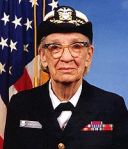Another Seat at the Table: Grace Hopper and Diversity
George Heilmeier was a master of getting a seat at the table for R&D (see “Guess Who’s Coming to Dinner“), but worlds can also collide when they expand, and as the 2009 Grace Murray Hopper Celebration of Women in Computing opens this week in Tuscon, I thought it would be a good time to mention the role that diversity plays in defining the role of innovation and innovators and to recall that Grace Hopper was a pioneer at the table.
Grace Hopper was already a legendary figure in computing when I met her as a graduate student in 1969. Retired from the Navy but recalled to active duty (eventually with the rank of Admiral) she lectured widely on the history of computers and programming languages. Her role in developing the first compiled programming languages for Harvard’s Mark I Computer and later with Eckert-Mauchley Computer Corporation inspired early computer scientists — including this one — to concentrate on programming languages. Her lectures were always packed. She took her seat at the table in the days when there were only a handful of women in the computing industry and although she counseled young women entering the field, she did not talk about her role in expanding the boundaries of computing in any of the interactions I had with her. She preferred to concentrate on technology and where it was heading.
The celebration that carries her name is a series of conferences designed to highlight the contributions of women to the field of information technology. It has special significance to me because I spent much my tenure as Dean of Computing at Georgia Tech expanding the boundaries of computing.
This idea of expanding boundaries was born in 2002 when computing education was in a downward spiral after the dot-com bust. This may not not sound like colliding worlds, but in fact our solution to the problem of declining enrollments was to remake undergraduate computing education with a new face that was more inclusive — more open to broader participation. That meant lifelong, relevant education focused on combining student interests and real-world needs and impact. It meant ignoring disciplinary boundaries, which was something not all universities did.
It also meant, literally, “new faces” in classrooms — on both sides of the podium — and laboratories. Shortly after I became dean, Beth Mynatt, now Director of Georgia Tech’s GVU Center, said to me, “You know, you can’t have a more diverse college without intellectual diversity.” So our initiative A New Face of Computing at Georgia Tech became defined in part by the New Faces who were brought into the field by an explosion of new programs and degrees.
As the Grace Hopper Celebration kicks off this week in Houston, it’s a good time to be reminded that there’s always room for more at the table. It keeps worlds from colliding, expands social networks, and promotes innovation. Let’s celebrate that.


Hi,
I just wanted to say how much I enjoyed your post on Grace Hopper. I would have loved to meet her. I met Anita Borg at a conference, she was inspirational. I’ve tried hard since then to be a resource to women in computing. And as a faculty member, I’ve felt I had even more opportunities to embrace diversity. Thanks, it’s been one of the things I’ve enjoyed the most.
As a european, I’ve also noticed that it’s not always the same when I travel in the continent. I’ve been in far too many academic settings where I’ve been the only woman (a project meeting with 20 academics, classes). I find that awkward and sad. It feels very unusual, I honestly feel quite strange when I am alone in my gender. And its sad because I think diversity does bring precisely the type of intellectual rewards that you note.
As a British woman, growing up during the reign of Queen Elizabeth and while Margaret Thatcher was Prime Minister, I know from personal experience that I didn’t rule out possibilities of what I might accomplish as a woman. Women leading was just the way it was…
LikeLike
The citizens of Gardner, KS are currently working to recall two members of their City Council. The recall is tied up in the courts at the moment, but it should go to a vote in March of 2010.
LikeLike